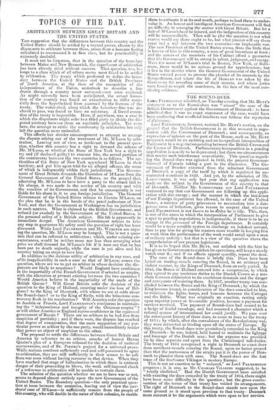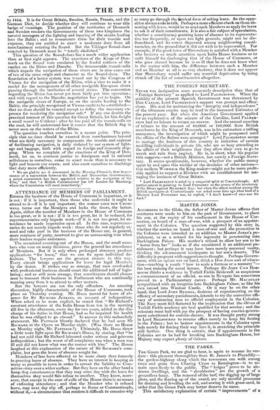THE SOUND-DUES.
LORD PALMERSTON admitted, on Tuesday evening, that Mr. Hurr's statement as to the Sound-dues was " almost" the case of the British Government against the Government of Denmark : to have admitted that it was an exact statement of the case, would have been confessing that unofficial intellects can fitthom the mysteries of diplomacy.
Lord PAentEnsToN, however, resisted Mr. Herr's motion, on the ground that the British Government is at this moment in nego- tiation with the Government of Denmark ; and consequently, an expression of opinion on the part of the House, such as Mr. Hew proposed, would be an unfitting and an inexpedient interposition of Parliament in a negotiation pending between the British Crown and the Crown of Denmark. Parliamentary interposition in a pending negotiation is usually to be deprecated; but there are circumstances that render such interference unavoidable. This question regard- ing the Sound-dues was agitated in 1836, the present Governor- General of Canada taking a part in the discussion. The Go- vernment of Sweden extorted from the reluctant Government of Denmark a copy of the tariff by which it regulated its un- warranted exactions in 1839. And yet, by the admission of Mr. L ABOIT HERE, it was only last year that any application was made on the subject by the Government of this country to that of Denmark. Neither Mr. LA BOUCHERE nor Lord PALMERSTON ventured to say that our Government are following up this appli- cation with due energy ; and the manner in which the indolence of our Foreign department has allowed, in the case of the United States, a number of petty grievances to accumulate into a dan- gerous mass of irritation, gives reason to suspect that wherever Lord PALMERSTON is not known to be active he is idle. This, then, is one of the cases in which the interposition of Parliament to give a spur to pending negotiations is indispensable, if there is to be no change in the personnel of the Foreign department. It certainly would be a more sensible system to discharge an indolent servant, than to pay him for giving his masters more trouble in keeping him at work than the performance of the work would entail upon a man of ordinary activity : but that is a view of the question above the comprehension of our present legislators.
It is to be hoped that Mr. HuTT, not satisfied with the hint he has given to Government to quicken its operations, will keep a steady watch over it - and if no effects appear speedily, repeat the dose. The case Of the Sound-dues is briefly this. Dues have been levied on trading-vessels entering the Sound, in an arbitrary and violent manner, by the Kings of Denmark, from an early period. In 164, the States of Holland entered into a compromise, by which they agreed to pay moderate duties to the Danish Crown as a me- dium between submission to its exorbitant demands and the danger and annoyance of resisting them. In 1647, another treaty was con- cluded between the States and the King of Denmark ; by which the King became bound, in consideration of the dues conceded to him, to maintain the lights, buoys, and beacons between the Cattegat and the Baltic. What was originally an exaction, resting solely upon superior power or favourable position, became a payment for services received. The payment of Sound-dues had ceased to be a badge of feudal vassalage, and had assumed a character which a rational system of international law could justify. We pass over the subsequent history of these dues, to come at once to the treaty of 1814; by which, after the convulsions of the Revolutionary war, they were reenacted as binding upon all the states of Europe. By this treaty, the Sound-dues were gratuitously conceded to the King of Denmark : he was, indeed, held bound to maintain the lightage and buoyage of the Danish seas ; but the expense was provided for by dues separate and apart from the Christianpol toll-duties. The treaty of 1814 recognized a right in Denmark to exact dues from merchant-vessels entering the Sound, upon no better ground than that the narrowness of the straits put it in the power of Den- mark to plunder them with ease. The Sound-dues are the last trace of the freebooter Vikingor in modern Europe.
This is not an exaction to be " reduced," as Lord PALMERSTON proposes ; it is one, as Mr. CHARLES VILLIERS suggested, to be " totally abolished." Had the Danish Government been satisfied with exacting the dues conceded by the treaty of 1814, there might have been some difficulty in the question ; but the gross contra- vention of the terms of that treaty has voided its arrangements. The right of Denmark to the Sound-dues stands now upon the same ground as it stood upon previous to that treaty : Denmark must sunnort it by the arguments which were open to her ureviou to 18)4. It is for Great Britain, Sweden, Russia, Prussia, and the German Diet, to decide whether they will continue to wear this badge of vassalage. The position of the territories of Denmark and Sweden renders the Governments of these two kingdoms the natural managers of the lighting and buoying of the straits leading into the Baltic ; and to remunerate them for their trouble and expense, they are entitled to exact a moderate duty from all merchantmen entering the Sound. But the Vikingor Sound-dues exacted by Denmark must be " totally abolished." This question of the Sound-dues has a much wider application than at first sight appears. The exactions of the Kings of Den- mark on the Sound were emulated by the feudal robbers of the castles on the Rhine and Danube. The innumerable transit-tolls which impede the navigation of these rivers are in nine cases out of ten of the same origin and character as the Sound-dues.' The foundation of a better system was traced out by the Congress of Vienna for the navigation of the Rhine, with a view to make it a model for the management of all other navigable European rivers passing through the territories of several states. The convention regarding the Rhine has never yet been fairly put into operation ; and with regard to the Danube, negotiation has yet to begin. On the navigable rivers of Europe, as on the straits leading to the Baltic, the principle recognized at Vienna ought to be established— that no dues should be exacted except to defray the necessary ex- penses for rendering the navigation safe.* If any one doubts the practical interest of this question for Great Britain, let him freight a small vessel to Coblenz : after he has paid all the transit-tolls on the road, be will understand how it comes that the British flag is never seen on the waters of the Rhine.
The question touches ourselves in a nearer point. The prin- ciple that no dues should be exacted from merchantmen beyond what are fairly necessary to compensate the trouble and expense of facilitating navigation, is daily violated by our system of light- age and baggage, both with regard to foreign and domestic ship- ping. When we complain of the exactions of the King of Den- mark, let us, in common justice to foreigners and in rational selfishness to ourselves, cease to exact more than is necessary to light and beacon our coasts, and also exert ourselves to discharge that duty more efficiently.
• We are glad to see it announced in the -*forming Chronicle, that in pur- suance of a convention between the British and Hanoverian Government-a, a mixed commission has been appointed relative to the navigation of the Elbe," and that " a British Commissioner has left London for Hamburg, where the Commission will meet immediately."



























 Previous page
Previous page